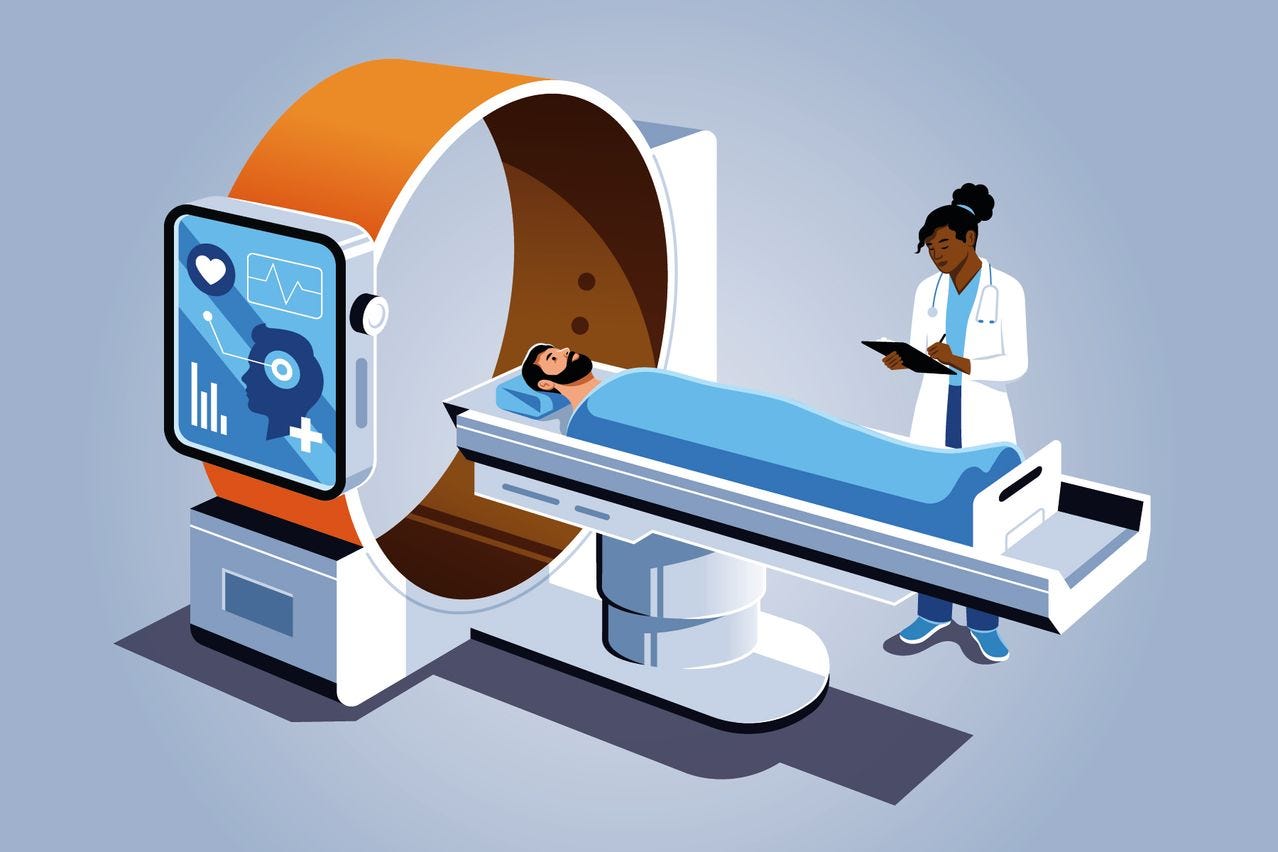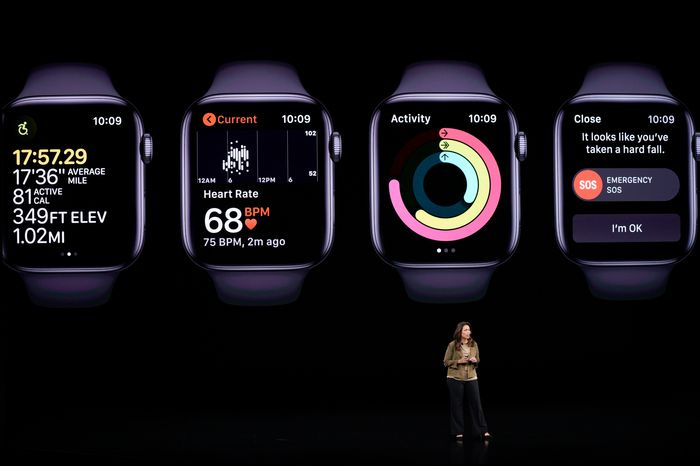AI: Apple Watch & AI Healthcare. RTZ #404
...starting to make a difference, especially before we get sick
This past week, I did a 2nd podcast on “AI’s Tech Value Growth’ on my friend Howard Lindzon’s podcast, with the ‘Trends with Friends’ team. (First one here, four months ago, discussing Apple Vision Pro and other tech things).
And one of the co-hosts Phil Pearlman, who is very focused on personal health and living a better life through better living, brought up an important point and question. It’s one many folks struggle with today. How to think about technology and really start using it for better health, while living normal, busy lives.
We were discussing AI, the explosion of data, healthcare technologies, and regulatory realities. Specifically, Phil’s key point was as follows (starts at around the 35 minute mark of the ‘Trends with Friends’ podcast):
“I’m very focused on health and I know you’re talking about regulation. How it’s going to take a slow, long time. But there is not regulation when it comes to personal health, right?”
“So there’s already to much data. I mean, I can get my heart rate, variability, I can get so much data already, on my Watch. And I’ve been leaning away from that because I’m into living a better life. I know how I feel but now the way you’re talking, it’s like it’s Go time for me. It’s like I’ve been avoiding quantitative self so far.”
“My question is this: How long are we away from when I’m wearing the Apple Watch and it says to me Phil, in the you know, in that HAL voice from 2001, a Space Oydssey (1968), ‘Phil, you really have to see your doctor’. How far are we away from that”.
I answered that we’re very close in terms of mainstream applications in the coming months.
But the answer is ALSO that we’re already on the threshold of what Phil is asking about above. In many ways today, there are growing examples of how the sensors, data, and machine learning AI algorithms and software apps on Apple Watches, providing timely signals to go check with the doctor.
The Wall Street Journal’s Christopher Mims has a piece saying “Apple Watch is becoming Doctors’ Favorite Medical Device”:
“Some doctors are telling patients to get the watch to manage their conditions. Researchers study how it could be used for heart disease, post-surgery recovery and other conditions.”
“Doctors are opting for the Apple Watch because of the device’s simplicity, affordability, and ubiquity—Apple shipped about 40 million of its watches in 2023 alone, and even more in previous years.”
“Doctors are using the Apple Watch as part of how they diagnose and help their patients manage disease—whether or not it’s been specifically approved for such applications by the Food and Drug Administration or other regulatory bodies.”
“My own mother, who has a history of atrial fibrillation, a heart-rhythm disorder, is one such patient. The Apple Watch SE she bought on her doctor’s advice has been, by her account, a lifesaving intervention. It allows her to send data gathered by her watch directly to her doctor, as part of the continuing management of her lifestyle and medication.”
“There’s a large and growing body of research on how the Apple Watch is being used informally in medical care, despite other approved devices being available to track the same metrics.”
“Not a week goes by in my clinic in which someone doesn’t come by and say, ‘My Apple Watch says I have an abnormal heart rhythm,’ ” says Dr. Rod Passman, a cardiologist and professor of medicine at Northwestern Medicine in Chicago.”
“Passman is currently conducting a six-year, National Institutes of Health-funded study, which includes 85 research centers across the country, as well as collaboration from Apple itself. The study is intended to determine whether data from the Apple Watch can be used in an app to significantly reduce the amount of time people with atrial fibrillation have to spend on blood-thinning medications. Currently, such patients must be on them all the time, even though they come with risks. The hope is that with an Apple Watch detecting if atrial fibrillation is actually occurring, patients.”
“Meanwhile, many other doctors are telling their patients to go out and buy an Apple Watch to alert them to episodes of atrial fibrillation, despite the fact that the watch is not approved for performing this function in patients who already have a history of the disorder. (Apple Watch is FDA approved for alerting people with no history of atrial fibrillation that they are having an episode of it, but before you can turn on that function, you must answer “no” when the watch asks if you have a history of the issue.)”
The WSJ piece gives a vivid, specific example:
“For Dr. Ruud Koster, a 72-year-old Apple Watch wearer living in Amsterdam, no such algorithm was required—because Koster has been a cardiologist for 50 years.”
“His experience shows what might be possible in the future, he says, if clinicians can apply to Apple Watch data new algorithms that possess the same pattern-matching skills he employed when, two years ago, he looked at an electrocardiogram from his Apple Watch after a workout at the gym.”
“Much to Koster’s surprise, the trace of that ECG on his watch indicated, in a single dip at the end, that he might be having a problem with his heart known as a silent ischemia. Feeling no discomfort or other symptoms, he continued to perform ECGs on himself using his watch over the following hour. The results indicated he should go to his doctor.”
“Soon after, he had bypass surgery to fix arteries in his heart that had become constricted. He wrote up the entire saga in a recent case report. Without his Apple Watch, he might not have discovered this life-threatening issue until it was too late, he says.”
The piece also gives the downside of these technologies, that of the ‘false positive’, from the increasing abundance of sensor data from millions of devices like Apple Watches and beyond:
“One major challenge of the potential flood of data from the Apple Watch is false positives. In a world in which tens of millions of wearables might be alerting people to potential health issues, record numbers of people might head for the hospital for unnecessary and expensive tests, says Koster. This is one reason regulators scrutinize medical devices before allowing their manufacturers to make specific claims about their abilities.”
But this issue of ‘false positives’ is a ‘high class’ problem, stemming from going from ‘Scarcity to Abudance’ due to technology, in this case AI, a phenomenon we’ve seen through every tech cycle to date. It can and will be managed. Healthcare is just the next major vertical area seeing the benefits of this trend.
Again, from my perspective, as I discuss on the podcast above, AI has a potentially big, positive role to play going forward.
And not just healthcare with a capital ‘H’ for AFTER we get sick, but healthcare with a lower case ‘h’, for BEFORE we get sick.
The AFTER we get sick represents most of our current Healthcare system and spend. That’s currently at 20% of the US’s $27 trillion annual GDP, or over $5 trillion, the highest in the world on both those counts.That contrasts with around 10% or less of the GDP of most other developed countries in Europe, and Asia like Japan and South Korea. But the BEFORE getting sick is where AI of all kinds, the data that is and can be collected by the smart devices in our lives, and the right ‘nudges’ from AI ‘smart agents’, ‘companions’ and ‘agentic workflows can potentially make all the difference in the world.
And it’s not just via Apple Watches, but a plethora of smartphones and other devices. All being enabled to capture, and use massive amounts of personal data. My friend Howard mentioned cameras in our phones ‘nudging’ us how to live better (41 minute mark), and TwF co-host JC Parets talking about services like Whoop AI by OpenAI (36 minute mark), used by many people today as well.
The whole podcast time and topic index is available here for folks who’d like to examine the wide range of topics discussed.
But in terms of AI and Healthcare, the future is early and bright. With more basic and applied scientific research, properly secured for privacy, trust, and safety, for mainstream folks to live better lives.In terms of us living better, healthier lives than has ever been possible before. AI has a big role to play in Healthcare as I’ve discussed more broadly before.
Apple, with its relatively unique AI strategy, is taking a lead for now with its devices and ecosystem, thinking different. A point I summarize in video here.
We are at the earliest days, and the beginning of the beginning in terms of this AI Tech Wave. Stay tuned.
NOTE: The discussions here are for information purposes only, and not meant as investment advice at any time. Thanks for joining us here)











